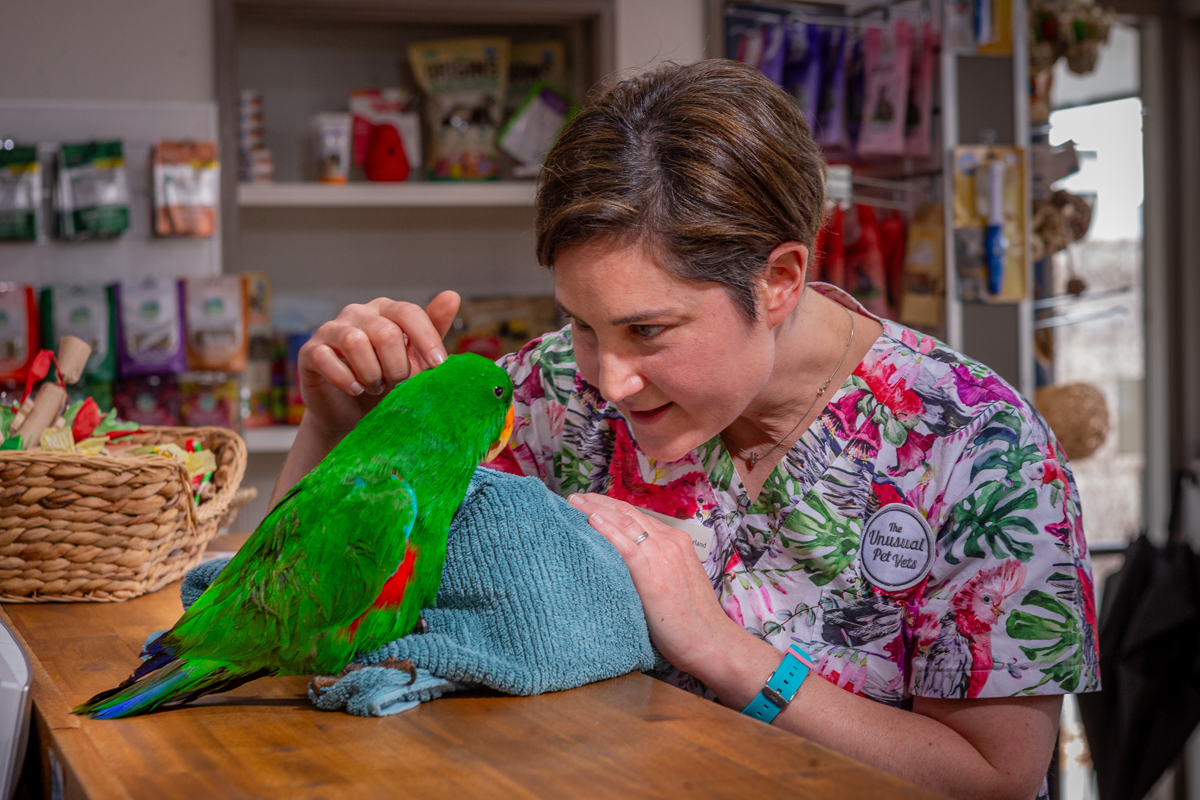
5 minute read
VETS FOR UNUSUAL pets
By Muriel Cooper Photos Gary Sissons
Snakes, ferrets, fish, frogs, frilled-neck lizards, axolotls, and even spiders! Dr Michelle Sutherland has treated them all. Michelle, a vet specialising in exotic animals at The Unusual Pet Vets in Frankston, became an exotic pet vet partly to help educate people on how to look after them. Michelle says, “An unusual pet is anything that isn’t a dog, cat, or large animal like a horse or a cow." The most unusual pets she has had to treat are seahorses (which you can keep as a pet).
What could go wrong with a spider? “Spiders get skin issues. Their sensory whiskers will fall off, and they can get injured like anything else. My colleague, Shane, has seen Sydney funnel web spiders, which he’s welcome to as far as I’m concerned,” Michelle laughs.
Asked if snakes have a personality, Michelle says, “Absolutely yes! The jungle python we saw with the sign ‘caution’ is definitely a personality issue,” she laughs. “Snakes can be really rewarding pets. You can be interactive with them and, to our clients, their special exotic pet is the light of their world.”
Do rabbits have personalities? "Every Animal has a personality,” says Michelle. “I think there’s a lot of misconceptions that they don’t when people aren’t familiar with these types of animals. It’s like,’ Oh, they’re just a chicken.’ Chickens have wonderful personalities, and they’re extremely bright. You can train them to do things if you want to.”
An unusual pet is anything that isn’t a dog, cat, or large animal like a horse or a cow
Has Michelle had any close calls while treating unusual pets?
“I was bitten by a snake once, but you can usually tell by their body language what mood they’re in. I had hold of its head, and it moved suddenly, and it turned around and bit me on my hand because I hadn’t got its head in quite the right position. But it’s pretty rare.” In case you’re concerned, the snake was non-venomous.
The Centralion python (pictured) is a homeless snake rescued by a program the Unusual Pet Vets clinic and hospital participates in called ‘Homeless Herps’ (in cooperation with the Department of Water, Land and Planning). They are animals the department or the police have seized because of illegal trade, for example, or have just been found in the wild. They are obviously escaped pets and are rehomed by ballot once they’ve had a health check. To keep reptiles or amphibians, you will need a licence.
Koalas are definitely a no-no, but there are some native mammals you can keep as pets, like some species of wallabies and spinifex hopping mice. But many of the native species have quite specific husbandry requirements, so it is worthwhile researching those – or any pet before you get it. Michelle discourages impulse purchases.
Michelle says, “It’s never appropriate to take an animal directly from the wild, even though members of the public are trying to do the right thing but don’t understand there are systems in place to help protect the animals. People will keep them for a few days or weeks before bringing them in, which can be quite stressful for the animal. We encourage people who find sick or injured wildlife to take them to any vet. It doesn’t have to be us."
I always knew I wanted to be an exotics or wildlife vet...
People are motivated to keep unusual pets for various reasons, but one of the current reasons is the trend towards inner city living, smaller spaces and less time. These sorts of pets are more manageable in apartments, but Michelle says they still need to have open space to exercise and run around.
Michelle completed a zoology degree and worked with wildlife but was passionate about being a vet, so went back and did a second degree in Veterinary Science. “I always knew I wanted to be an exotics or wildlife vet, and I’ve been working with them for ten years.”
The most common ailments presenting at the clinic for birds are reproductive issues in backyard chickens because, as Michelle says, “We’ve selectively bred them to be layers.” The beautiful Eclectus parrot pictured is called ‘Eckie’ and has had chemotherapy. ‘Marshmallow’ the duck is a sweetheart. Michelle says, “In rabbits, we see a lot of ear and dental disease and gut problems, as is the case with giant rabbit ‘Felix’ (pictured).
We see a lot of parasitic problems in reptiles. Unfortunately, with turtles, many issues have to do with how they’re looked after; like people not changing their water frequently enough.”
Michelle’s favourite patients are cockatiels. “They’re the best birds ever. They’re so much fun. They all have really amazing personalities. They’re super cute to have around. I also really love rabbit." I have two giant rabbits at home, so they’re close to my heart.”












